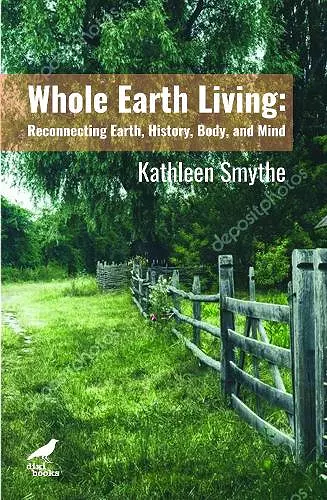Whole Earth Living
Reconnecting Earth, History, Body, and Mind
Format:Paperback
Publisher:Dixi Books (UK) Limited
Published:28th Sep '20
Should be back in stock very soon

Whole Earth Living argues that human society needs a change of consciousness if we are going to ensure long-term human survival on Earth. It uses long-term history, evolutionary biology, neuroscience and philosophy to develop a new sustainability paradigm. The paradigm focuses on opportunities for optimal human and ecological welfare by reconnecting earth, history, body and mind. This book is a hopeful one. After establishing the losses, it suggests that there are fundamental re-orientations that humans as individuals and members of society can make that are more hopeful and more meaningful than some of the current formulations offered for a sustainable future. Instead of renouncing aspects of our lives, we can return to some forms of self-sufficiency (gardening, sewing, and woodworking, for example) individually, within households and communities in order to receive positive benefits, such as reducing disease and isolation.
If we are to take full advantage of the chance for a planetary reset that the COVID 19 pandemic affords us, Kathleen Smythe's deep dive into our genetic and cultural inheritance is a good place to start. Smythe's analysis of the role of feet and hands in human evolution alone is worth the price of the book and can change your life. Even more important is her proposal for an education geared to homecoming. Focused on socially useful work and community resilience, Smythe's case for place based, experiential learning will produce ecologically informed citizens who will help us save our world. by John D. Fairfield Professor at History Department at Xavier University; Kathleen Smythe’s Whole Earth Living combines scholarship and personal experience, analysis and activism, thinking and feeling—the kind of thoughtful work we need from universities today. With a historian’s deep sense of history, Smythe honestly faces the crises—social and ecological—that define our world and offers a framework for thinking about a way back into our bodies and to the earth. This is a book that is both bracing and tender, as Smythe finds ways to deal with harsh realities that are restorative. Whole Earth Living is recommended reading for those of us in industrial societies who are searching for more engaged ways to live today that can help create more options for the future.; —Robert Jensen, Emeritus Professor, University of Texas at Austin, author of Plain Radical: Living, Loving, and Learning to Leave the Planet Gracefully.; Kathleen Smythe's Whole Earth Living sets out an ambitious goal: re-storying the present in order to embrace and nourish interdependence. A wide-ranging historical analysis of human evolution, religion, technology, and economy, Whole Earth Living brings a new view of the future into sight, one in which humans make meaning together through embodied connection with each other and with the Earth. -- Hannah Eisler Burnett, Center for Humans and Nature;Kathleen Smythe’s Whole Earth Living is a much-needed book at this major junction point in human history. Her hopes are no less bold than restoring the value that has been lost from human lives in a cloud of technological gadgetry and achieving a robust mode of sustainability that embraces pan-species flourishing.; Smythe brings her rich historical understanding of agriculture, technology, and politics to explore how humanity has lost its way. And, beyond this critique of modern humanity’s rocky path, she presents a vision for what meaningful work and meaningful lives could and should look like, now and in the future, with a style that is at once highly readable and persuasive. “We need to look differently at who humans were, and who we are now,” Smythe writes, cutting to the nub of the issue. “Then we might be able to achieve the cultural change that could overturn the dominant understanding of our relationship to nature.”; While the book draws on the authors’ experience of living in the United States, as well as Africa, the issues discussed, and their potential ramifications, will be relevant to any citizen of a country whose government is currently paving an unsustainable path into a hostile future. And, as Smythe argues, changes are possible. “Such changes are not cumbersome, depressing, or impossible,” she writes. Instead, they are “realistic, hope-filled, and a more honest reflection of where we have come from and who we might be as a species.”; Smythe’s excellent book holds the potential to help ensure humanity takes the right path at the junction point.;—Joe Gray, Associate Editor, The Ecological Citizen; Chair of GENIE (the Global Ecocentric Network for Implementing Ecodemocracy), and a Knowledge Advisor on ecological ethics for the United Nations’ Harmony with Nature programme.
ISBN: 9781913680015
Dimensions: 210mm x 135mm x 120mm
Weight: 206g
208 pages